Ruth Bader Ginsburg: I Couldn’t Get Confirmed Today
Supreme Court nominees were confirmed quite easily within recent memory. What's changed?
Ruth Bader Ginsburg was confirmed to the Supreme Court 96-3 back in 1993. She doesn’t believe that could happen in today’s climate.
U.S. Supreme Court Justice Ruth Bader Ginsburg said Monday that the confirmation process has become much more partisan and that she probably never would have made it to the high court under the current climate.
“I wish we could wave a magic wand and go back to the days when the process was bipartisan,” Ginsburg told the crowd of about 2,000 as she spoke as part of a lecture series for Southern Methodist University’s Dedman School of Law.
[…]
Before her appointment to the Supreme Court, she served as a judge on the U.S. Court of Appeals for the District of Columbia Circuit, a spot she was appointed to in 1980. She has also been a law school professor and served as general counsel for the American Civil Liberties Union in addition to helping launch its Women’s Rights Project.
Ginsburg said that to practice for her Senate confirmation hearings, White House staffers in mock hearings grilled her on her work for the ACLU. During those mock hearings she told them: “There’s nothing you can do to get me to bad mouth the ACLU.”
Such grilling, though, did not happen, she said. She was confirmed 96-3.
“Today, my ACLU connection would probably disqualify me,” she said.
She’s almost certainly right. It’s noteworthy, too, that Antonin Scalia was confirmed 98-0 in 1986. In his case, Republicans had a slim 53-47 majority–with an election two months away that would flip control to the Democrats 55-45. In her case, Democrats had a very strong 57-43 majority. Still, not only was neither filibustered but all or virtually all of the Senators from the opposition party voted to confirm. Stephen Breyer, nominated during the contentious 1994 cycle, was confirmed 87-9.
All the recent nominees, by contrast, have drawn significant opposition. Elena Kagan got 37 No votes; Sonia Sotomayor 31; Sam Alito 42; and John Roberts 22. The climate has obviously changed radically. Especially since all of those nominees were, arguably, more centrist than Ginsburg or Scalia.
As Steve Benen points out, plenty of the same Senators who voted Yay on Ginsburg voted Nay on Kagan:
Note that plenty of Republican senators whose names will sound familiar — Chuck Grassley, Kay Bailey Hutchison, John McCain, Mitch McConnell — all voted for her nomination. (Then note that in 2010, Elena Kagan confirmed on a 63-to-37 vote — and Grassley, Hutchison, McCain, and McConnell all voted against her.)
Part of this is the advent of the Permanent Campaign. In an era of multiple 24/7/365 cable news outlets–two of which have actively become partisan venues–and blogs, Twitter, and the like, there is no breathing period between campaign cycles when Senators can be senatorial.
Additionally, there’s a growing recognition that the judiciary, and the Supreme Court in particular, are the key decision-makers on a wide variety of the most controversial public policy issues combined with the illusion that the courts are non-partisan, non-ideological venues having evaporated. With each new opening having the potential to make a dramatic swing in the outcome of these cases for decades, it’s hardly shocking that nominations are now as hard-fought as major pieces of legislation.
Now, like Scott Lemieux, I’m inclined to think Ginsburg would still get confirmed, especially with a 57-43 Democratic majority in the Senate. But she would certainly get more than 3 votes against.
On a different but somewhat related subject, when I saw the headline “Justice Ginsburg: If I Were Nominated Today, My Women’s Rights Work For The ACLU Would Probably Disqualify Me” at memeorandum, I thought Ginsburg was going to make the point that she would be expected to recuse herself from any number of cases on women’s issues and/or brought by the ACLU. That’s becoming the norm, now, as testified to by the plethora of Obama administration cases Kagan has had to step aside from.
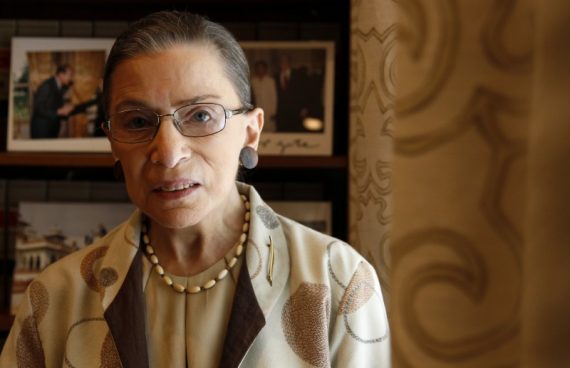

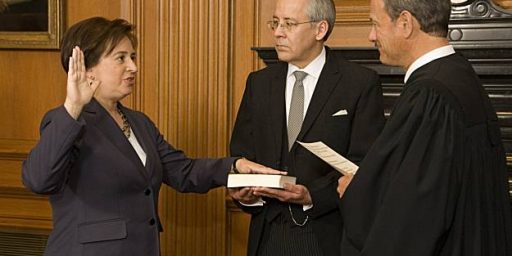
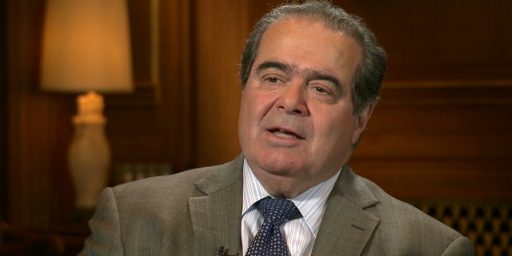

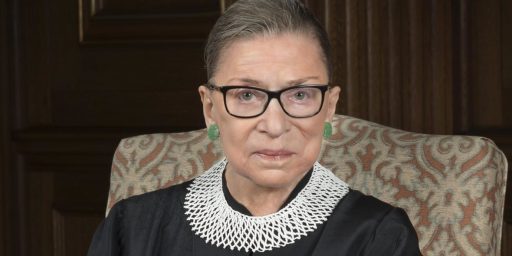
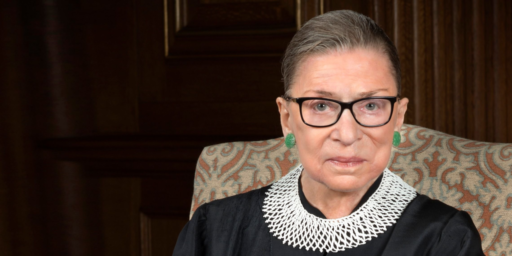
True, but it’s worth noting that Scalia was nominated for the court at the same time that William Rehnquist was nominated to be elevated to Chief Justice of the United States. Rather than spending time on Scalia, the Democrats in the Senate decided to concentrate their fire on Rehnquist, who had already been through one contentious nomination fight during the Nixon Administration. As a result, Scalia kind of slipped in under the wire.
While Scalia was confirmed unanimously to replace Rehnquist as an Associate Justice, there were 33 no votes against Rehnquist.
She may be overlooking one of the things that made her attractive to the other side: she was 60 years old, when the Republicans were nominating people in their 40s and early 50s. I suspect the Republicans would not oppose a 78 year old appointment to the Supreme Court today, no matter how liberal.
As an addition to Ginsburg’s comments I would add that, under the current political climate, neither Scalia nor Thomas would be confirmable,
I really wonder if as long as the Senate remains as polarized as it is and it takes 60 votes for confirmation if we will actually see a new justice confirmed any time soon.
Justice Bork would care to disagree.
J.
The contentious confirmation process began with Ted Kennedy’s (D- Chivas) hyper-partisan grilling of Robert Bork. He made it so bad that there was no way that Bork could be confirmed. From then on, the Democrats followed the meme set by Kennedy, whenever there was a Republican nominee for the courts.
Ginsburg also may not appreciate how ideology was being channelled in those days. During the Reagan/Bush years, Republicans took the position that a qualified nominee (meaning a Court of Appeals justice) should be confirmed regardless of ideology. She was the beneficiary of an ideologically oriented goal of overturning Roe v. Wade.
Thomas was confirmed only because the Democrats in the South that were forced to vote against Bork(Essentially, because of his views against Civil Rights, that alienated Black voters) voted for him because polls at time showed that a majority of Blacks supported him.
@Stan25: It wasn’t the grilling that doomed Bork’s chances — it was his answers. It’s amazing that conservatives continue to whine about this — it was the Senate functioning as it should, denying confirmation to a radical reactionary who belileves to this day that the first amendment only applies to political speech. He should never have been nominated, and his defeat was one of Ted Kennedy’s great acts.
What a tragedy there was no one to expose the extreme corporatist views of Roberts and Alito. Oh, wait, it wouldn’t have mattered, since both were eager to perjure themselves and they were selected because they both had slim paper trails.
. @Stan25:
Only when it was deserved, as it was with Bork.
For example, after Bork was defeated, the man that Reagan subsequently nominated, Anthony Kennedy, won approval unanimously.
What changed??
Wow.
Um, Robert Bork. Douglas Ginsburg. Clarence Thomas. John Roberts. Sam Alito. Ring any bells?
thats what i was thinking…
I would hope the hell not!
@Jay Tea, @Stan25: and @Tsar Nicholas II: But Bork and Thomas were genuinely controversial–Bork for his very unorthodox, even by conservative lights, views on legal doctrine and Thomas because of the Anita Hill allegations. But Kennedy was unanimously confirmed after Bork and Ginsburg nearly unanimously after Thomas.
When I watched the Bork hearings the summer between High School and my first year of college, I was pissed off at the way he was treated. Years later, after reading Bork’s later writing and having him as a Con Law Professor at George Mason Law School, I can honestly say I am glad he wasn;’t confirmed.
@Doug Mataconis: I had a similar turn on Bork. He’s obviously a very bright guy and his resume more than qualified him for the Court. But his views are out there and he’s gone off the deep end in recent years. How much of that’s bitterness over his treatment and how much is just who he always was I couldn’t say.
Let’s not forget about Bork’s involvement in the Saturday Night Massacre.
The guy who said that? Spent the rest of his life — another 20 years — as “the Lion of the Senate.”
I’d be bitter, too.
J.
@James Joyner:
Ironically, the fall semester I had Bork for Con Law also happened to coincide with the Thomas confirmation hearings. When the whole Anita Hill fiasco happened, he started off class by saying ‘I know you’re all going to want me to say something about what’s happening on Capitol Hill. So, I’ll say this, I told you so.’
@Jay Tea:
I’d be bitter, too.
Most scumbags are bitter when people tell the truth about them. So it goes.
@Jay Tea: Exactly where he should have been.
I guess you think there’s something wrong about what Kennedy said. But if you’re trying to make a point, you might want to, you know, make it. Because quoting Kennedy without giving any reason to doubt him doesn’t do your cause a lot of good…
From what I remember about Bork’s hearings, what set the tone for later on wasn’t so much the opposition to his views (which were fairly radical), but the extreme politicization in which the opposition was set forth. It resembled the extreme utterances of undergrads arguing a point at the pub rather than say a thesis defense – it was all black and white extremities rather than analysis of his positions – ie his positions were on the edge, but they and their consequences were much more complex than was laid out in the debate. It was about soundbit. And it was extremely predictable that it would set the standard for the future.
Kind of reminded me of how the Soviet’s boycott of the LA Olympics in 1984 was completely predictable once the US boycotted the Moscow Olympics in 1980. Once the gloves are off, its hard for anyone to put them back on. Bork could have been denied without turning it into a political circus.
@Doug Mataconis:
While I obvious did not have Bork as a prof, this tracks with my general reactions as well.
@James Joyner:
Bitterness and becoming a conservative icon likely informed his later writings to some degree, but if one looks at his views in his more recent writings I think that they pretty much comport with his pre-nomination views. His role in Nixon administration also has given me considerable retrospective pause.